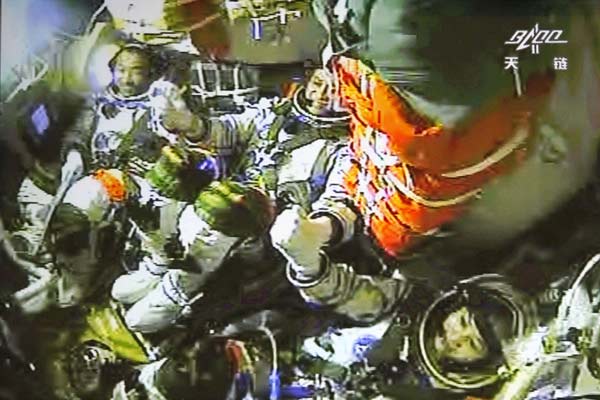Spacecraft completes manual docking
|
 |
|
A screen at the Beijing Aerospace Control Center shows Shenzhou X astronauts Nie Haisheng (center), Zhang Xiaoguang and Wang Yaping celebrating after the spacecraft completed a manual docking with the orbiting Tiangong-1 space module on Sunday. ZHANG XIAOQI / FOR CHINA DAILY |
Country able to assemble a space station by 2020, expert says
The Shenzhou X spacecraft completed a manual docking with the orbiting Tiangong-1 space module on Sunday, the last docking maneuver before China's manned space program enters the space lab stage.
Carrying three astronauts, the spacecraft was manually separated from Tiangong-1 at 8:26 am on Sunday, according to the Beijing Aerospace Control Center.
Piloted by the crew commander Nie Haisheng, the manned spacecraft approached the Tiangong-1, made contact with it at 10 am, and the two were locked together at 10:07 am.
The other two crew members, Zhang Xiaoguang and female astronaut Wang Yaping, assisted Nie by monitoring instruments and making sure the craft was on target.
The manual docking on Sunday is the country's second, following a successful manual docking between the manned Shenzhou IX spacecraft and Tiangong-1 in 2012.
Previously, the unmanned Shenzhou VIII spacecraft had conducted two robotic dockings with Tiangong-1 in 2011. Shenzhou IX and Shenzhou X have each completed a robotic docking with the space module.
Multiple docking experiments were arranged to confirm China has mastered the space rendezvous and docking technologies, because each docking attempt between two vessels moving at 28,000 kilometers per hour could have different results due to the changing space environment, space experts said.



























